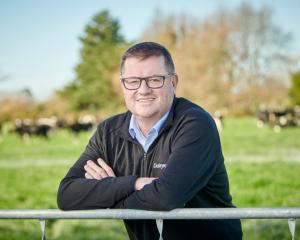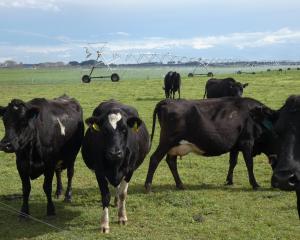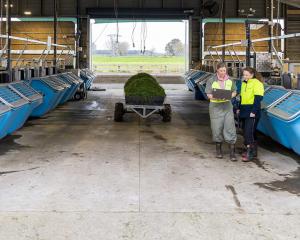
The North Canterbury couple are in their fifth season as contract milkers and co-owners of Knightlea Farm, in a partnership with his grandparents Alan and Marion Crowe from Karalea Holsteins and the Winter family — her parents, brothers and uncle.
The farm is a semi-self-contained dairy and cropping operation growing maize, barley whole crop and kale to winter their cows on.
They split calve 640 Holstein Friesian cows on 225ha. Last season, in their best year yet, the herd produced 607kg of milksolids a cow — a goal the couple had been striving for.
The couple were both brought up locally.
Mr Bailey’s parents, Stephen and Jo, were sharemilking Holstein Friesian cows in Rangiora.
"I loved the farm and having to go to school was a real inconvenience to me," William Bailey said.
"I spent all of my time outside of school helping Dad and Granddad on the farm, milking, shifting sprinklers and carting silage."
Unfortunately, when he was 8, his father died. The herd and all the farm gear was sold. He spent all of his spare time with his grandfather.
"A neighbouring dairy farming couple, Donald and Julie Smith, also took me under their wing to give me the farming experience that I needed. I spent weekends and holidays there, which led to my first farming job."
After that, he worked for a local silage contractor for a few years before going back to dairy farming.
Mrs Bailey was brought up on her family’s beef and cropping farm, Knighton, in Kaiapoi. After high school, she studied at Lincoln University, completing a diploma in agriculture.
"I had a love for cows, so in my spare time I would go to my second cousins, the Wakelins [Belbrook Holstein Friesians], where I first learnt to milk cows. While studying, I milked at the Wakelins every second weekend and worked on my family’s cropping farm. After I did my year of study I carried on working on my parents’ farm and relief-milked on a farm in Swannanoa."
She was then offered a full-time farm assistant job and that was where she met her future husband, who was starting work there as second-in-charge.
He went on to work for the Stewarts at Cresslands Holstein Friesians full time for one season, while she relief milked there and worked on her parents’ farm.
Mr Bailey was then offered a job at Karalea Holsteins in Bankside, while she got a job on a Jersey farm next door.
"This was just for a season, as we had a contract milking job lined up for the next season back in Rangiora," she said.
"We contract milked this 400-cow farm for four seasons.
"In our first year contract milking, we also purchased 24ha of land in Clarkville, which we use as dairy support."
Towards the end of the last season of contract milking, the couple were told Mr Bailey’s grandparents’ farm was going to be sold.
"We were given the opportunity to be part of this farm but we turned it down as we didn’t want to move away from our families," he said.
"Ironically, we heard the farm in Swannanoa where we met was coming up for sale, so we had a look over the farm and managed to buy it in partnership with my grandparents and Lou’s family."
The couple’s Knightlea stud, named after Knighton and Karalea, started with 20 heifer calves. That included 10 crossbred calves from the farm they previously worked on in Swannanoa, and 10 pedigree Holstein Friesian animals from the Wakelins.
"These heifers were grazed at Will’s lease block in Cust, until their first year in milk when they were leased out, as we had nowhere to milk them," Mrs Bailey said. "But we started milking these 20 heifers ourselves as part of the 400-cow herd in our first year contract milking. From then on, our herd grew and when we bought the farm in Swannanoa we had 40 cows of our own to join the 600-cow herd."
The couple also bought some of the Karalea/Annalea herd at the dispersal sale in 2018 and everything that wasn’t for sale came to them as well. The next year, they also bought all the rising 1-year-old heifers that had not been in the sale.
"The herd has been around a long time," Mr Bailey said.
"It has 60-plus years of breeding in it as Granddad first registered an animal in 1965. I’d like to carry that herd on for another generation. There’s so much history and breeding already."
When it comes to mating, it is all artificial insemination (AI), no bulls, thanks to the business investing in Allflex collars for the herd.
In spring, they do 12 weeks of AI. They focus on using sexed semen on their top-performing cows and follow up with beef genetics at the other end.
In autumn, they do six weeks of AI, again focusing on using more sexed semen.
Calving starts on March 1 and then again on August 1.
They generally keep 100 as replacements in spring and 20 in autumn.
They select semen for the following mating objectives: a cow with good stature, that’s not too big; good conformation, production, fertility and an all-round dairy cow.
"We have used some Westcoast Alcove and Benner Bardo in recent years that produced some great animals," Mrs Bailey said.
Mr Bailey said the Holstein Friesian breed were great to milk and had excellent production capability.
"I did grow up on a farm with Holstein Friesians so I don’t know any different, but they’re definitely worth milking all the same," he said.
Everything was kept in-house. Calves were grazed on grass and maize silage until their first winter. Mrs Bailey’s family took calves from May until calving, supplying all the wheat and growing maize and grass silage for the dairy farm.
"It works out well for everyone, as the dairy farm has a great supplier and Will, I and my family have a sale and there is somewhere for crops to go," she said.
With 3-year-old Stella and another baby on the way, they have their hands full.
They aim to do more production, breed more efficient cows and install a feed pad.
Stella recently chose her first calf to take to the Rangiora A&P Show and some closer investigation revealed the calf wasn’t just a cutie — Knightlea Alcove Pixie is a granddaughter of Belallen Goldwyn Pet-ET, one of the most well-known cows to have been milked in the Karalea/Annalea herd.
Sons of Pet have been marketed previously in New Zealand by artificial breeding companies.
Mr Crowe was also chuffed after helping pick the calf.
With this pedigree, the Baileys looked forward to seeing what the future held for Stella’s first show calf.
Both previously helped employees at shows, but since having their own herd had yet to exhibit any of their own cows.
They aimed to get Stella into showing so she could share the experience they had.
They did enjoy participating in Semex On-Farm competitions and had had success in Canterbury competitions, particularly with two Benner Bardo daughters, Annalea Bardo Hally and Annalea Bardo Oval, both of whom have multiple Karalea/Annalea generations behind them.
Farm facts
Owners: Winter and Crowe families
Contract milkers: William and Louise Bailey trading as Knightlea Ltd
Location: Rangiora, Canterbury
Farm size: 225ha effective
Cows: 640 registered Holstein Friesian cows
Production: 607kgMS/cow
Stud name: Knightlea













